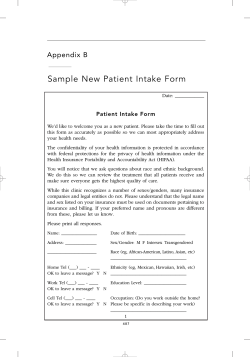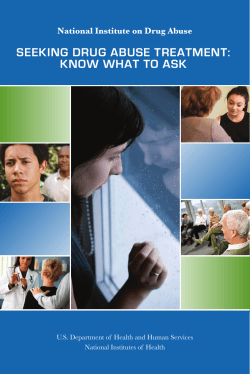
How to Increase Access to Substance Abuse Treatment: Implementing NIATx... Nalan Ward, MD; Margaret Harvey, PsyD Background
How to Increase Access to Substance Abuse Treatment: Implementing NIATx Model Nalan Ward, MD; Margaret Harvey, PsyD Department of Psychiatry, Massachusetts General Hospital and Harvard Medical School, Boston, MA Conclusions Methods Results Founded in 2003, the Network for the Improvement of Addiction Treatment. (NIATx) works with behavioral health care organizations across the country to improve access to and retention in treatment for the millions of Americans with substance abuse and/or mental health issues(1). In 2007, NIATx launched the first clinical trial that examines process improvement in addiction treatment. NIATx 200, funded by the National Institute on Drug Abuse, brought together 200 treatment providers from five states, Massachusetts, Michigan, New York, Oregon and Washington, to study NIATx strategies to improve treatment quality, operations, and finances (1). The West End Clinic (WEC)-Outpatient Addiction Services at the Massachusetts General Hospital was one of the sites invited to participate in this service improvement project. WEC is an adult outpatient substance abuse treatment center based in an academic general hospital in Boston, MA. This was a 4-year (2008-2012)prospective examination of promising practices that were implemented to increase access and reduce wait time to intake in substance abuse treatment. 48months of clinic data were examined to determine yearly number of intakes, total visit volume, and wait time for intake. A “Plan-Do-Study-Act” cycle was applied to try evaluate promising practices. Yearly number of intakes, total patient visit volume and wait time to intake were calculated to measure outcome. To reduce the wait time to intake and increase number of intake slots “Plan Do Study Act (PDSA)” cycle was used (1). • Plan: Identify aim of effort (i.e.: reducing wait time) • Do: Trial run, for short period of time (increase number of intake slots) • Study: Staff looks at benefits and drawbacks of the trial • Act: Staff fixes trial if imperfect results, or implements it in regular practice if no significant problems Reduce in Wait Time to Intake Access to treatment remains one of the most important aspects of addiction based services. As part of the Niatx200 project, we aimed to implement “Plan-Do-Study-Act” cycle to study the effect of promising practices on • increasing access to treatment, • reducing wait time to initial assessment • increasing available treatment services for substance abuse. TEMPLATE DESIGN © 2008 www.PosterPresentations.com Results Number of Intakes in 2008 : 6-8 intake slots weekly. Wait Time to Intake in 2008 :16 days. Yearly Visit Volume: 6,653 in FY07. PDSA cycle example: -eliminate backlog of patients waiting for intake -increase the number of intake slots Days Background 20 15 . 10 5 0 16 3 Before June 08 After June 08 Number of Intakes 224 200 • Our yearly visit volume was almost doubled from 7.540 in FY2008 to 14,714 in FY2011. • It is important to emphasize the increase in the number of intake slots was achieved without an increased number of staff. Tow years prior, to accommodate the needs of increased number of patients in treatment at WEC, a 0.5 FTE RN and a 0.5 FTE addiction psychiatrist were hired. Increase in Intake Volume 250 • Our findings point out to the value of increasing access to substance abuse treatment. By using the PDSA cycle, a timely, efficient and patient–centered service model was developed (2,3). 173 150 100 50 0 Jan-June 08 July -Dec 08 Increase in Visit Volume 16,000 14,714 14,000 12,306 12,000 8,000 6,653 References 1-www.niatx.net 2-Improving care for the treatment of alcohol and drug disorders. 10,112 10,000 • Increase in treatment services included • Intensive Outpatient Programs (Day, Evening, Young Adult for 18-25yo) • Opioid Agoinst Maintenance Treatment (Buprenorphine) • Naltrexone Injection Clinic • Evidence Based Group Therapies McCarty D, Gustafson D, Capoccia VA, Cotter F. J Behav Health Serv Res. 2009 Jan;36(1):52-60. 3-The Network for the Improvement of Addiction Treatment (NIATx): enhancing access and retention.McCarty D, Gustafson DH, Wisdom JP, Ford J, Choi D, Molfenter T, Capoccia V, Cotter F.Drug Alcohol Depend. 2007 May 11;88(2-3):138-45. . 7,540 6,000 4,000 2,000 Contact Information 0 FY07 FY08 FY09 FY10 FY11 Nalan Ward, MD enward@partners.org.
© Copyright 2025





















